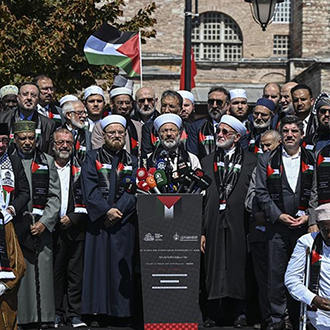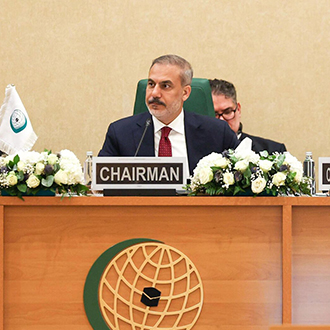Numerous examples can be cited to illustrate the Prophet Muhammad’s dedication to educating and guiding his ummah by the Qur’an’s commands. The prominent ones are as follows:
Molding life with worship
Islam extends beyond a mere belief system; it necessitates the fulfillment of specific acts of worship by its adherents. Therefore, the Qur’an places a strong emphasis on acts of worship that the servant is obligated to perform at specific intervals, particularly ritual prayer and fasting. Notably, the Qur’an contains approximately one hundred verses about ritual prayer, which is a daily obligation. We observe that the Prophet Muhammad, recognizing its status as a duty of servitude, also devoted special attention to this practice with the dual purpose of both demonstrating its significance and endearing it to the believers around him. Moreover, we observe that the Prophet Muhammad placed exceptional importance on the mosque as the designated place for performing obligatory prayers. By utilizing the mosque as a common gathering space, he facilitated the dissemination of knowledge by enabling him to respond to inquiries and share his insights with a wider audience. Indeed, as a blessing of this approach, a significant portion of the Prophet’s teachings was meticulously transmitted by his Companions who listened to him in the mosque. Moreover, the mosque catalyzed fostering unity and strengthening bonds among all Muslims. Of paramount importance, Prophet Muhammad demonstrated the practical performance of worship. In this way, the Prophet, whom Allah appointed as a guide for the ummah, served as a mentor to his companions in terms of the significance and proper execution of worship. In light of this, it would be no exaggeration to assert that the Prophet Muhammad placed the mosque at the center of his life, reaching the hearts of many through it and instilling in them a love for worship.
Making moral values prevail in life
On various occasions, the Qur’an outlines the fundamental moral principles for interpersonal relationships to strengthen the bond of Islamic brotherhood. It urges believers to heed these principles. As the messenger entrusted with conveying these verses to humanity, Prophet Muhammad also embodied the Qur’an’s commandments in his own life. Consequently, a Muslim looking upon the Prophet Muhammad could witness within him the very moral values that the Qur’an prescribes for all individuals. Undoubtedly, this situation served as a tangible manifestation of the Messenger of Allah’s role as a guide for the ummah. Indeed, through observing his actions, Muslims not only gained a clear understanding of how to live as true Muslims but were also inspired to emulate his exemplary conduct. For this very reason, all companions, both men and women, emulated the Messenger of Allah’s noble character, and after his demise, they continued to guide subsequent generations on how to live as true Muslims. ‘A’isha’s (ra) statement, “The character of the Messenger of Allah (saw) was the Qur’an.” (Muslim, Musafirin, 139) essentially summarizes this situation.
Justice and merit
The Qur’an places a strong emphasis on upholding social order through justice within the context of moral values, encompassing numerous verses dedicated to this principle. Indeed, it is self-evident that, in the absence of justice, all societal values will inevitably crumble. Prophet Muhammad (saw) always observed justice in both administrative governance and legal matters. The governance style he established, which was in harmony with the religion he conveyed, played a highly significant role in Islam taking root in the hearts of people. Indeed, injustice was among the primary grievances of the people during the Age of Ignorance.
Tending to the needs of the underprivileged
Within the context of social solidarity, the Qur’an places the greatest emphasis on the worship of zakat and sadaqah. In this regard, the verses in the Qur’an instruct those who extend assistance to those in need to refrain from arrogance stemming from their charitable acts, to remain humble, and to perform their charitable acts with the love of worship. Undoubtedly, it is a significant challenge for an individual to willingly share a portion of their hard-earned wealth with someone who has not contributed to it. The Qur’an’s inculcation of this trait among believers and its encouragement of giving, emphasizing that it will not diminish one’s wealth but rather bring blessings, (Baqarah, 2:276) is an exceptional practice from the perspective of the fraternal bond it aims to establish among Muslims.
Examining the Prophet Muhammad’s practices related to zakat and sadaqah, both as a prophet guided by the Qur’an’s commandments and as a community leader, we observe his unwavering concern for the underprivileged, even prioritizing the poor over his own needs. A remarkable aspect of his leadership was his consideration of not only the needy in Medina but also those in other cities when distributing war spoils. Undoubtedly, his unwavering commitment to giving, prioritizing his Muslim brethren over the accumulation of worldly possessions, served as an inspiration for the believers who witnessed his actions, encouraging them to engage in acts of charity themselves.
Respecting human dignity
Ali (ra), describing the Prophet’s treatment of people, said: “Allah’s Messenger (saw) was always good-humored, easy-going, mild[1]mannered, neither rude nor coarse, nor boisterous, nor obscene, nor slanderous, nor avaricious. He would take no interest in what he did not desire, he would not leave anyone who pleaded with him hopeless or disappointed.” (Tirmidhi, Shama’il, p. 199) When Ali said this, it was as if he was interpreting this verse: “Had you been cruel or hard-hearted, they would have certainly abandoned you.” (Al-i ‘Imran, 3:159)
Examining just two examples of his practices in fostering relationships among believers, or, in other words, his art of winning people’s hearts, the greatness of the final messenger, guided by the Qur’an, becomes even more evident.
1. When the Prophet Muhammad learned of a mistake that required correction, he would issue a general admonition without naming the individual, allowing those who had committed similar errors to rectify their actions (Musnad, 12065). Through this approach, he preserved the dignity of the wrongdoer and avoided alienating them.
2. His graceful manner of correcting those who erred in his presence serves as a valuable lesson for us all. Muawiyah ibn al-Hakam al-Sulami narrated the following in this context: “While I was praying with the Messenger of Allah (saw), a man in the company sneezed. I said: ‘Yarhamuk Allah!’ The people stared at me with disapproving looks, so I said: ‘Woe be upon me, why is it that you stare at me?’ They began to strike their hands on their thighs, and when I saw them urging me to observe silence butI said nothing. When the Messenger of Allah (saw) had said the prayer (and I declare that neither before him nor after him have I seen a leader who gave better instruction than he for whom I would give my father and mother as ransom). I swear that he did not scold, beat or revile me but said: ‘Talking to persons is not fitting during the prayer, for it consists of glorifying Allah, declaring his Greatness. And recitation of the Qur’an or words to that effect.’” (Muslim, 537) The Messenger of Allah (saw) also stated that it is not appropriate to look left and right during prayer (Bukhari, 751; Tirmidhi, 589).
It is time to put words into action
There is much to be said about the exemplary conduct of the Prophet Muhammad (saw). The Qur’an and hadith books illuminate this matter in great detail. The essence lies in letting actions precede words. The words of the late Islamic scholar Shu’ayb al-Arna’ut should be our benchmark: “While we certainly hope that everyone embraces Islam, we do not compel or require anyone to convert. With over 1.6 billion adherents worldwide, Islam has already established a significant presence. Our primary focus should be on ensuring that the Islamic world adheres to the principles and teachings of Allah and His Messenger. By doing so, we will naturally attract others to the faith.”









